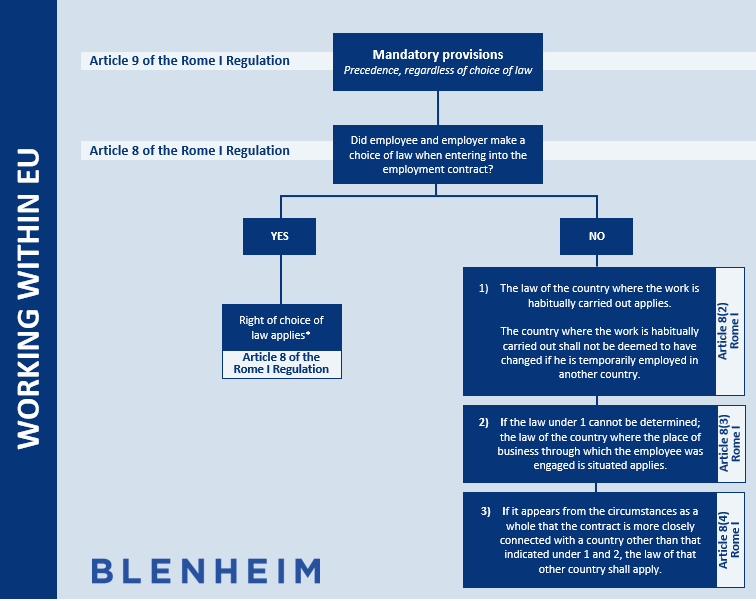In our practice, we have recently been seeing more cases regarding European secondment and more specifically the question which law is applicable to the employment relationship, as this can have consequences for the terms and conditions of employment that may apply.
The corona crisis and in particular the various lock-downs have lead to the situation that European posted workers have sometimes got stuck in the host country, returned to their home country earlier than planned and others may not even have been able to reach the host country to start (or continue) their work.
The place of work may have implications for the applicable employment conditions. As a result, additional terms and conditions of employment of the country where the work is being performed may apply.
Which law applies?
To assess which law applies in the event of European secondment, the Rome I Regulation (Regulation (EC) No. 593/2008) and the Posting of Workers Directive should be applied.
Rome I Regulation
To protect the position of employees, Article 8(1) of the Rome I Regulation provides that despite a choice of law the employee does not lose the protection of certain mandatory laws of the country in which he habitually works.
Yet, this protection does not apply if the employee is temporarily working in the Netherlands. In that case the country where the work is habitually carried out shall not be deemed to have changed.
Posting of Workers Directive and WagwEU
As posting based on this Rome I rule can lead to unfair competition and social exploitation the Posting of Workers Directive was created. The Posting of Workers Directive has been implemented by each Member State and grants posted workers basic employment protection in case European companies post their worker in NL. In the Netherlands, this Directive has been codified into the Terms of Employment for Seconded Employees in the European Union Act (WagwEU) which has lastly been changed in March 2020.
In case of secondment you may think of European multinational companies that second employees to their own offices in the Netherlands and for instance agencies that temporary second employees to work in the Netherlands. To prevent misunderstanding, foreign employees who temporarily come to work for a Dutch employer do not fall under the WagwEU.
Additional terms of employment in the event of secondment
The WagwEU briefly holds that during the first 12 months of secondment, the posted worker is entitled to “hard-core provisions” under Dutch law such as minimum wage, holiday allowance, equal treatment, holidays, working conditions and working hours.
After a period of 12 months, additional conditions may apply such as rights deriving from collective labour agreements that have been declared generally binding. The 12-month period can be extended to a maximum of 18 months under certain circumstances.
In the diagrams below the systematics of both the Rome I regulation and the Posting of Working Directive are being displayed.
Of course, the assessment of the legal position should always be assessed on an individual basis based on the fact and circumstances of the matter.
If you have any questions about European secondment and/or cross border employment relations, please contact Blenheim’s employment law team.
Working within the EU, establishing applicable law (Rome I)

* The choice of law may not result in the employee losing protection of mandatory provisions of the law applicable without a choice of law.
Seconded to the Netherlands (WagwEU)
